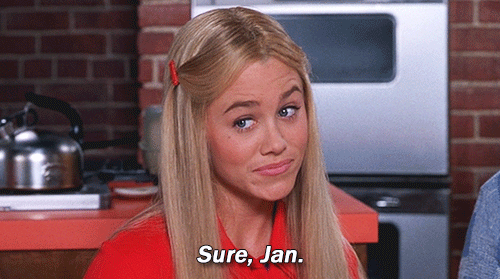Bad Omen: The Death of Veritas?
James O'Keefe was sacked by the Project Veritas board. Did Bourla call in a favor? We'll probably never know. Meanwhile, Custodia Bank's Caitlin Long drops haymakers on the US government.
There are a handful of moments from my childhood that have stuck with me. One great example of a key moment from my upbringing was walking through an airport with my father when I was 12 or 13 years old. I don’t remember the city. I don’t remember my exact age. I don’t even remember where we were going. But my father and I were walking through the terminal when we approached a random billboard and he stopped.
“Look at this,” my old man says as he approaches the core message on the billboard. He points to it and reads it out loud:
Money makes the world go round
“Don’t ever forget that,” he says. Then we kept going. No explanation. No discussion. Just a very simple, very quick nugget. “Okay, weirdo,” I thought to myself. But per his order, I’ve never forgotten it. I think it’s fair to say that very simple message has shaped my philosophical thinking in a variety of ways. To be honest, it is a fairly depressing take but it’s probably the truth. Money makes the world go round.
There is absolutely nothing wrong with honestly working toward the dream of financial independence. But unless you’re living completely off the grid, you probably need money. Of course, all too often with money, greed can become a motivator because homo sapiens can be bad at self-control. For all of the truly great things that money enables, money is also a big reason why corruption exists. And corruption is likely a big reason why lobbying is a thing. Gotta grease the wheels so they say. Wheels can be greased or sanded, actually.
Greasing the wheels might be why the pharmaceutical industry spends more on lobbying than any other industry:
Spent money. Make money. Pharma spent $372.1 million on lobbying last year, to be exact. Almost double the 2022 lobbying spend of electronics manufacturers, the 2nd biggest industry by 2022 lobbying spend. To be fair to Pharma, year over year lobbying spend for the industry only increased by 2.8% from 2021.
Of course, Pfizer’s PFE 0.00%↑ 2022 spend was up 35% year over year in 2022 - far surpassing the industry increase. And now we get to the point…
James O’Keefe Out At Project Veritas
For those who haven’t heard of him, James O’Keefe is the founder and former CEO of Project Veritas - a donor-funded investigative journalism organization. Veritas has been frequently denounced by the mainstream press for its hidden camera “gotcha” style approach to investigative work. The outlet gained notoriety roughly a decade ago for investigations of ACORN and NPR. More recently, a Veritas investigation covered journalistic standards at PoopCorp TGNA 0.00%↑.
The details of O’Keefe’s departure are bizarre but it seems fairly clear he didn’t leave because he wanted to. I haven’t personally followed everything that Veritas has uncovered but I have highlighted some of their work in the past. No matter how insulated from independent voices one might be it was probably impossible not to see the late January Veritas videos of Pfizer employee Jordon Trishton Walker talking about intentionally mutating the virus to create more injection variations - you know, so that Pfizer can justify more revenue.
This leads to the rather obvious theory that Pfizer has somehow infiltrated Project Veritas to orchestrate a coup of this nature. It’s difficult not to draw that connection given how much Veritas content over the last several weeks has covered Pfizer or Pfizer CEO Albert Bourla specifically. Look, I don’t know what the hell happened to James O’Keefe. I know what I’d be putting my money on with a gun to my head, but that’s completely circumstantial.
Ultimately the original sin wasn’t even that O’Keefe and Veritas came after Pfizer. The problem was probably that Project Veritas was constructed in a way that made Project Veritas capturable. Non-profits are given certain tax advantages - not just for the organizations themselves but for the people who donate to them. These kinds of entities require boards and it certainly appears as though the Project Veritas board bagged the CEO at the behest of some sort of powerful entity. That or it’s because O’Keefe is a dick and difficult to work for.
The Lesson
At the end of the day, O’Keefe will be fine. He has an army of supporters and an axe to grind. Project Veritas though is likely toast. The viewers are pissed about this. We’re already seeing a movement to unfollow Veritas on the social channels and it’s actually incredible how badly Project Veritas is hemorrhaging followers on Twitter:
After coughing up nearly 154k followers just today, Project Veritas is now down nearly 12% in the two weeks since O’Keefe was put on leave with the majority of that decline happening in a single day - incredible. For what it’s worth, O’Keefe’s Twitter is up over 11% in the same time frame. But Twitter follower numbers are often a vanity metric and little more. Regardless how O’Keefe ends up adapting the idea of Project Veritas, I hope he avoids the non-profit structure. I understand why he did it that way originally, but I think we can now see the flaws.
The bottom line is, there are too many better options out there. Maybe he’ll rebuild on Substack. Maybe he’ll rebuild on Rumble. Maybe both. For any content business or creator, the takeaway is this; you have to know who you’re accountable to. You have to know what your pain points are. You have understand how easy it could be to choke you off and take the steps necessary to mitigate those risks.
The Bad News
I didn’t watch Project Veritas regularly but this sure feels like a bad omen. The word “veritas” is a Roman word used to describe truth. That a well-known founder/CEO of journalistic entity with that name can get taken out so easily by unseen forces feels ominous. This is probably far from over.
These sorts of things are likely to intensify and it goes far beyond Pfizer, the medical industrial complex, or issues with large media conglomerates. Have you been following any of the other fresh hell that has been happening over the last few weeks? Spy balloons, a massive train derailment, and the ‘revelation’ that it was actually the United States that took out the Nord Stream pipeline last year. With so many ridiculous news stories it’s difficult to figure out which ones are the distractions and which ones require more attention.
Of course, much of my focus lately has been on the crypto market and the regulatory firestorm that industry has been dealing with over the last several weeks. We now have a coordinated effort from the feds to do as much damage to the domestic cryptocurrency industry as humanly possible. It’s so bad, that even pro-regulation Custodia Bank CEO Caitlin Long now seems fatigued with the entire process:
Custodia Bank recently found itself in the crosshairs of Beltway Politics at their worst. Custodia was simultaneously attacked by the White House, the Federal Reserve Board of Governors, the Kansas City Fed and Senator Dick Durbin (who conflated our non-leveraged, 100-percent liquid and solvent bank with FTX in a Senate floor speech, in which he attacked two companies run by female CEOs – Fidelity and Custodia – implicitly comparing us to a 29-year-old accused fraudster who is now wearing an ankle bracelet). Custodia tried to become federally regulated – the very result bipartisan policymakers claim to want. Yet Custodia has been denied and now disparaged for daring to come through the front door.
Bold my emphasis. This is a pretty telling statement from Long and she’s not alone in this sentiment.
The Good News
Though she isn’t alone, Caitlin Long is a terrific voice for crypto as a movement. In that same piece just referenced, she summed up the argument that I feel like I’ve been making about crypto since I started this blog - only she did it with far less characters required:
Here’s the reality: Internet-native money exists, and it won’t be uninvented. Today, U.S. dollars can move across the internet without banks and without permission, settling as fast as the speed of light and at a fraction of the cost of incumbent payment systems.
Again, bold my emphasis. She’s right. And it speaks to points I’ve made about the inevitability of permissionless value exchange here, here, and here. If it doesn’t seem like these things are connected, they aren’t - not directly, at least. But permissionless payment rails are everything. It is what takes the power of financial weaponization away from the federal government, the banks, and Wall Street. And permissionless wins no matter how many temper tantrums Charlie Munger has about it.
The worst combination for a corrupt regime is truth seekers without bosses coupled with payment rails without gate keepers. And that’s exactly what the people are getting. Separate money from the state, and we get a very different world. Why? Because money makes the world go ‘round.
Don’t ever forget that.








